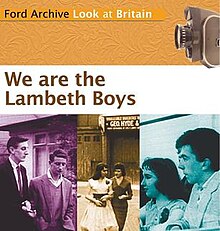
The oldest known surviving film was shot in the United Kingdom as well as early colour films. While film production reached an all-time high in 1936, the "golden age" of British cinema is usually thought to have occurred in the 1940s, during which the directors David Lean, Michael Powell, and Carol Reed produced their most critically acclaimed works. Many British actors have accrued critical success and worldwide recognition, such as Audrey Hepburn, Olivia de Havilland, Vivien Leigh, Glynis Johns, Maggie Smith, Laurence Olivier, Michael Caine, Sean Connery, Ian Mckellen, Joan Collins, Judi Dench, Julie Andrews, Daniel Day-Lewis, Gary Oldman, Emma Thompson, Anthony Hopkins and Kate Winslet. Some of the films with the largest ever box office returns have been made in the United Kingdom, including the fourth and fifth highest-grossing film franchises.

Kennington is a district in south London, England. It is mainly within the London Borough of Lambeth, running along the boundary with the London Borough of Southwark, a boundary which can be discerned from the early medieval period between the Lambeth and St George's parishes of those boroughs respectively. It is located 1.4 miles (2.3 km) south of Charing Cross in Inner London and is identified as a local centre in the London Plan. It was a royal manor in the parish of St Mary, Lambeth in the county of Surrey and was the administrative centre of the parish from 1853. Proximity to central London was key to the development of the area as a residential suburb and it was incorporated into the metropolitan area of London in 1855.

Karel Reisz was a Czech-born British filmmaker and film critic, one of the pioneers of the new realist strain in British cinema during the 1950s and 1960s. Two of the best-known films he directed are Saturday Night and Sunday Morning (1960), a classic of kitchen sink realism, and the romantic period drama The French Lieutenant's Woman (1981).

Vauxhall and I is the fourth studio album by English alternative rock musician Morrissey. It was released on 14 March 1994, by the record label Parlophone in the UK and Sire/Reprise in the US.
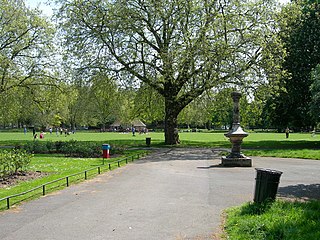
Kennington Park is a public park in Kennington, south London and lies between Kennington Park Road and St. Agnes Place. It was opened in 1854 on the site of what had been Kennington Common, where the Chartists gathered for their biggest "monster rally" on 10 April 1848. Soon after this demonstration the common was enclosed and, sponsored by the royal family, made into a public park.
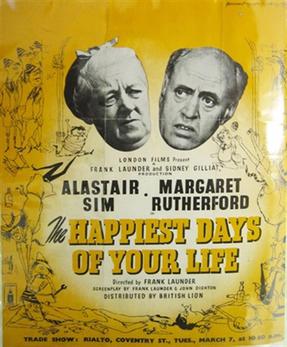
The Happiest Days of Your Life is a 1950 British comedy film directed by Frank Launder, based on the 1947 play of the same name by John Dighton. The two men also wrote the screenplay. It is one of a stable of classic British film comedies produced by Frank Launder and Sidney Gilliat for British Lion Film Corporation. The film was made on location in Liss and at Riverside Studios, London. In several respects, including some common casting, it was a precursor of the St. Trinian's films of the 1950s and 1960s.
Robert Hamer was a British film director and screenwriter best known for the 1949 black comedy Kind Hearts and Coronets and the now acknowledged 1947 classic It Always Rains on Sunday.
Sir Horace Shango Ové was a Trinidadian-born British filmmaker, photographer, painter and writer based in London, England. One of the leading black independent filmmakers to emerge in Britain in the post-war period, Ové was the first black British filmmaker to direct a feature-length film, Pressure (1976). In its retrospective documentary 100 Years of Cinema, the British Film Institute (BFI) declared: "Horace Ové is undoubtedly a pioneer in Black British history and his work provides a perspective on the Black experience in Britain."
Free Cinema was a documentary film movement that emerged in the United Kingdom in the mid-1950s. The term referred to an absence of propagandised intent or deliberate box office appeal. Co-founded by Lindsay Anderson with Karel Reisz, Tony Richardson and Lorenza Mazzetti, the movement began with a programme of three short films at the National Film Theatre, London on 5 February 1956. The programme was such a success that five more programmes appeared under the ‘Free Cinema’ banner before the founders decided to end the series. The last event was held in March 1959. Three of the screenings consisted of work from overseas filmmakers.
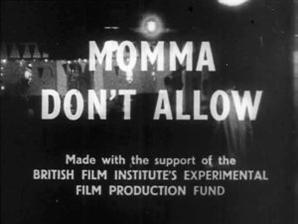
Momma Don't Allow is a 1956 short British documentary film co-directed by Karel Reisz and Tony Richardson, and filmed by Walter Lassally. Produced by the British Film Institute Experimental Film Fund, it was first shown in February 1956, as part of the first Free Cinema programme at the National Film Theatre.
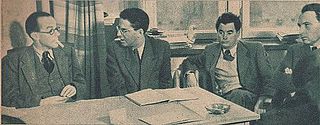
Basil Charles Wright was an English documentary filmmaker, film historian, film critic and teacher.

Bronco Bullfrog is a 1969 British kitchen sink teen drama film directed by Barney Platts-Mills and starring Del Walker, Anne Gooding and Sam Shepherd. Shot in black-and-white, it was Platts-Mills' first full-length feature film.
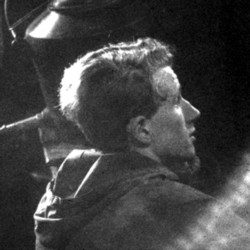
Michael Kenneth Christian Grigsby was an English documentary filmmaker.
Playing Away is a 1986 TV comedy film directed by Horace Ové, from a screenplay by Caryl Phillips.

The Cinema Museum is a museum in Kennington, London. Its collection was founded in 1986 by Ronald Grant and Martin Humphries, from their own private collection of cinema history and memorabilia. Its current building was once a workhouse where Charlie Chaplin lived as a child.
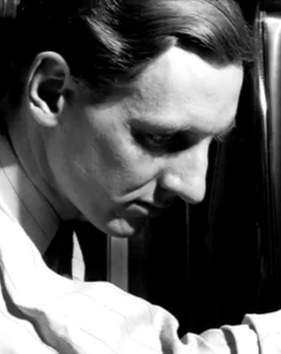
Stuart Legg was a pioneering English documentary filmmaker. At the 14th Academy Awards in 1941, Legg's National Film Board of Canada film Churchill's Island became the first-ever documentary to win an Oscar.
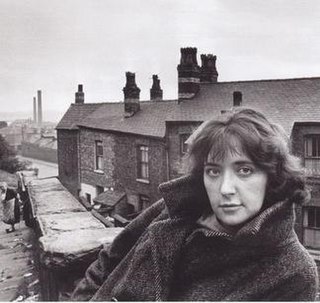
Shelagh Delaney FRSL was an English dramatist and screenwriter. Her debut work, A Taste of Honey (1958), has been described by Michael Patterson as "probably the most performed play by a post-war British woman playwright".
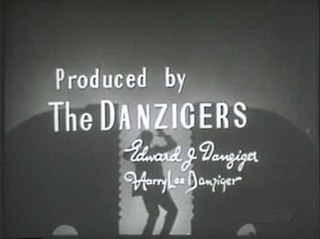
Edward J. Danziger (1909–1999) and Harry Lee Danziger (1913–2005) were American-born brothers who produced many British films and TV shows in the 1950s and 1960s.
The BFI Production Board (1964-2000) was a state-funded film production fund managed by the British Film Institute (BFI) and "explicitly charged with backing work by new and uncommercial filmmakers." Emerging from the Experimental Film Fund, the BFI Production Board was a major source of funding for experimental, art house, animation, short and documentary cinema, with a continuing commitment to funding under-represented voices in filmmaking.
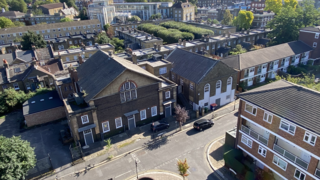
Alford House is a youth club in Aveline Road, Kennington, South London, England that was subject of the 1959 documentary by Karel Reisz We Are the Lambeth Boys and two sequels.
